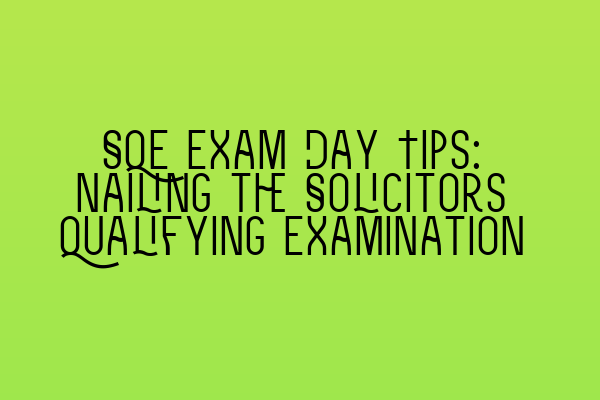SQE Exam Day Tips: Nailing the Solicitors Qualifying Examination
Are you preparing for the Solicitors Qualifying Examination (SQE) and feeling a mix of excitement and nerves as the exam day approaches? Well, you’re not alone. The SQE is a significant milestone in your legal career, and it’s essential to approach it with confidence and preparation. In this blog post, we will provide you with valuable tips and strategies to help you ace the SQE and increase your chances of passing the exam with flying colors.
1. Understand the Exam Structure
Before diving into your study materials, it’s crucial to familiarize yourself with the exam structure. The SQE consists of two stages: SQE1 and SQE2.
SQE1: This stage focuses on assessing your functioning legal knowledge. It includes multiple-choice questions (MCQs) and oral skills assessments.
SQE2: This stage assesses your practical legal skills. It includes written exercises and role-playing assessments.
Understanding the format and expectations of each stage will allow you to tailor your study plan accordingly.
2. Create a Study Plan
Effective time management is key to exam success. Develop a study plan that outlines the topics you need to cover and allocate specific time slots for each. Be realistic in your planning and set achievable goals. Take into account your personal commitments and create a schedule that balances study time with relaxation and self-care.
Ensure to include regular revision sessions, practice exams, and breaks to prevent burnout. Remember, consistency is key!
3. Utilize Exam Resources
Make the most of the resources available to you. Start by thoroughly reviewing the SQE syllabus and exam specifications provided by the Solicitors Regulation Authority (SRA). Familiarize yourself with what you need to know and focus your efforts on those areas.
Consider investing in reputable study materials, such as textbooks, online courses, and mock exams. These resources will provide you with valuable insights, practice questions, and feedback to gauge your progress and identify areas for improvement.
Remember to also check out our related articles for in-depth information on specific legal topics:
- Joint Ownership: Legal Considerations for Co-Owners of Property
- Commercial Leases: Essential Insights for Business Premises
- Tenant Rights in the UK: Understanding Your Legal Protections
- Property Transactions and the Legal Process: A Comprehensive Guide
- Mortgages and Land Law: Essential Knowledge for Property Practitioners
4. Practice Time Management
Time management is crucial during the exam. Practice answering questions within the allocated time limits to ensure you can complete the exam within the given timeframe. Identify time-consuming questions and learn when to skip, flag them for review, or come back to them later.
During your study sessions, simulate exam conditions to train yourself to work efficiently and accurately under time pressure. This will help you build confidence and reduce anxiety on the actual exam day.
5. Monitor Your Progress
Regularly assess your progress by taking practice exams and reviewing your performance. Pay attention to areas where you consistently struggle and focus on improving those weak points. Analyze your mistakes and learn from them; this will help you avoid similar errors during the actual exam.
Consider joining study groups or engaging with fellow candidates to discuss difficult concepts, share strategies, and gain new perspectives. Peer support can be invaluable during the preparation process.
6. Stay Calm and Confident
On the day of the exam, ensure you get enough rest the night before. Start your day with a healthy breakfast and arrive at the exam center early to avoid unnecessary stress. Take deep breaths and remind yourself that you have prepared diligently for this moment.
During the exam, if you feel overwhelmed or stuck on a question, take a moment to compose yourself. Remember, it’s okay to ask for clarification or seek assistance from the invigilators. Trust in your abilities and remain focused throughout.
7. Learn from Every Experience
Whether you pass or fail the SQE, view the experience as an opportunity for growth. Reflect on your exam performance and identify areas for improvement. If you need to retake the exam, use your previous experience to refine your study strategies and adjust your approach. Learn from each attempt, and keep pushing forward towards achieving your goal of becoming a qualified solicitor.
Remember, the SQE is just one step on your journey towards becoming a solicitor. Stay determined, stay motivated, and you will succeed!
Good luck!

Leave a Reply